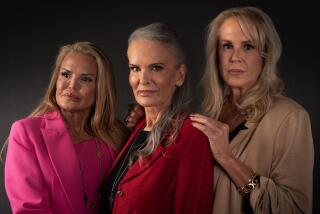For Many, No Joy in Sentence
- Share via
OKLAHOMA CITY — It may be right. It may be just. It may be exactly what the law demands.
But on Friday, as those most directly affected by the Oklahoma City bombing absorbed the news of Timothy J. McVeigh’s death sentence, they discovered that it also left them strangely unsatisfied.
It will not mend wounds. It will not restore lives. It will not make everything OK. Even those who desperately want the killer to die, who clenched their fists and wiped their eyes when the sentence was read, acknowledged that this was a day of some relief but little joy, leading them no closer to peace.
“I feel like justice was served, but it doesn’t really change anything for me,” said Priscilla Salyers, 46, a U.S. Customs Service employee who suffered a punctured lung and broken ribs in the blast. “I think some family members and survivors had the feeling that they were going to live happily ever after--that this was going to be some magic button--but it doesn’t work like that. There’s still pain.”
Standing in front of the sod-covered field that once bore the Alfred P. Murrah Federal Building, Salyers threw her arms around Sharon Medearis, whose 41-year-old husband, Claude, a Customs agent, perished in the attack. Medearis’ daughter, Kathy Alaniz, then joined in the embrace, the three women holding each other, tightly, in silence.
Despite all the vaunted psychobabble about closure, they acknowledged afterward, McVeigh’s condemnation is merely a beginning, not an end. As much as they want him to pay for America’s worst act of domestic terrorism with his own life, they’ve been forced to accept execution more as a legal procedure than a cosmic resolution to all they have lost.
“It’s not going to close anything,” Medearis said.
*
“When they put my ashes in a box and close the lid, that’s when there’ll be closure,” her daughter added.
Is this how it was supposed to be? So awkward and bittersweet?
After all, if ever a criminal case tried to honor the rights of victims, the Oklahoma City bombing trial was it. The prosecution was swift. The judge was stern. Survivors were invited to share their grief. For those unable to travel to Denver, a closed-circuit television system was installed back home--a first in the annals of U.S. District Court.
Indeed, after McVeigh’s June 2 conviction, “there was a real sense of victory,” said Connie Schlittler, a counselor at Project Heartland, a mental health service established after the bombing. “But by the end of the week, the high had passed. There was a letdown. There was a feeling, ‘What kind of victory is it really? Yeah, we got him. But now what?’ ”
In short, the system worked. But the system, even at its best, can only deliver justice. It does not undo the hurt.
“All the feelings are still there--anger, depression, anxiety,” Schlittler said. “None of the solutions within our system is really satisfactory. Nothing is going to bring back what they’ve lost.”
Unlike the day of McVeigh’s guilty verdict, when family members gathered around an old elm tree that weathered the bombing and doused it with water to symbolize the healing power of their tears, there was no orchestrated ceremony this time.
“We thought about it and decided not to,” said Paul Heath, a Veterans Adminstration psychologist who survived the blast. “We didn’t want to leave the impression that we were celebrating a man’s death.”
That’s not to say that McVeigh’s sentence wasn’t greeted without a few muted cheers by the crowd gathered downtown under a searing afternoon sun, just across from the bomb site. “We got him,” said Kathleen Treanor, whose 4-year-old daughter and in-laws all died in the attack.
Oklahoma City police chaplain Jack Poe unfurled an American flag with the help of Oklahoma County Dist. Atty. Bob Macy. Then they broke into an impromptu rendition of “God Bless America.”
“It was an act of courage on the part of the jury to do this,” said Oklahoma Gov. Frank Keating, who showed up a few minutes later. “It was an act of morality.”
*
But for every show of triumph, there seemed to be a reservoir of ambivalence.
“There’s no joy,” said Bud Welch, whose 23-year-old daughter, Julie Marie, worked as a Spanish translator in the federal building’s Social Security office.
“If any crime qualifies for the death penalty, this one certainly does,” he said. But as he stood near a tribute to his slain child--poems and photos mounted on the chain-link fence that draws thousands of visitors a day--Welch was unable to imagine how he could possibly find healing in McVeigh’s demise.
“How can you get any satisfaction from another human being dying?” he asked. “I need some peace in my life and there is no peace in that.”
More to Read
Sign up for Essential California
The most important California stories and recommendations in your inbox every morning.
You may occasionally receive promotional content from the Los Angeles Times.










